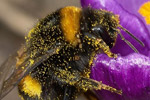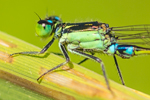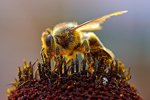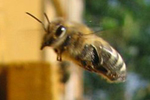Neonicotinoid pesticides, which have been increasingly blamed for the collapse of bee populations, may also impact human’s developing nervous system, according to a review of research by the European Food Safety Authority (EFSA). The EFSA says that current safety guidelines for two pesticides—acetamiprid and imidacloprid—may be too lax to protect humans, especially the developing brains of unborn children.
“Acetamiprid and imidacloprid may adversely affect the development of neurons and brain structures associated with functions such as learning and memory,” according to a press release from the EFSA. The finding is based on recent research published in PLoS ONE where scientists found that newborn rats exposed to the chemicals experienced movement issues, shrinking brains, reactionary problems, and weight loss.
THe EFSA recommends raising the safety limits of both the chemicals based on the research, though it notes that . However, the recommendation still has to be accepted by the European Commission.
“EFSA recognizes the available evidence has limitations and recommends further research be carried out to provide more robust data,” the organization said, but still said concerns over human health impacts were “legitimate.”
Europe has recently installed a two-year partial ban on three neonicotinoids—imidacloprid, clothianidin and thiamethoxam—due to research linking the pesticides to the collapse in bee colonies and other pollinators. Scientists have found that while the pesticides don’t kill bees outright, they impact their nervous systems, altering behavior to such an extent that eventually whole colonies collapse. However, neonicotinoid companies, Bayer and Syngenta, are suing to halt the ban. They argue that the science isn’t conclusive and that banning neonicotinoid will push farmers to use older pesticides, which have their own detrimental impacts.
Developed in the 1980s and 1990s, neonicotinoids are the most widely used insecticides in the world. To date, only Europe has installed even a partial ban on the chemicals.

European honey bee. Photo by: John Severns/Public Domain.
Related articles
Habitat loss and pesticides causing decline in Europe’s butterflies
(07/31/2013) Europe’s grassland butterfly population has plummeted in the past two decades, new research published on Tuesday shows, with a near halving in the numbers of key species since 1990.
Losing just one pollinator species leads to big plant declines

(07/22/2013) A shocking new study finds that losing just one pollinator species could lead to major declines in plant productivity, a finding that has broad implications for biodiversity conservation. Looking at ten bumblebee species in Colorado alpine meadows, two scientists found that removing a single bee species cut flower seed production by one-third. Pollinators worldwide are in major trouble as they are hit by habitat loss, pesticides, disease and other impacts. In fact, the EU has recently banned several pesticides that have been linked to the global bee decline.
Pesticides decimating dragonflies and other aquatic insects

(06/18/2013) While recent research (and media attention) has focused on the alleged negative impacts of pesticides on bees, the problem may be far broader according to a new study in the Proceedings of the US Academy of Sciences (PNAS). Looking at over 50 streams in Germany, France, and Australia, scientists in Europe and Australia found that pesticide contamination was capable of undercutting invertebrate biodiversity by nearly half.
EU labels another pesticide as bad for bees
(06/18/2013) A widely used insect nerve agent has been labelled a “high acute risk” to honeybees by the European Food Safety Authority (EFSA). A similar assessment by the EFSA on three other insecticides preceded the suspension of their use in the European Union.
U.S. loses nearly a third of its honey bees this season

(05/09/2013) Nearly a third of managed honeybee colonies in America died out or disappeared over the winter, an annual survey found on Wednesday. The decline—which was far worse than the winter before—threatens the survival of some bee colonies. The heavy losses of pollinators also threatens the country’s food supply, researchers said. The US Department of Agriculture has estimated that honeybees contribute some $20bn to the economy every year.
Europe bans pesticides linked to bee collapse
(04/29/2013) The EU has banned three neonicotinoid pesticides (imidacloprid, clothianidin and thiamethoxam) linked to the decline of bees for two years. The ban will apply to all flowering crops, such as corn, rape seed, and sunflowers. The move follows a flood of recent studies, some high-profile, that have linked neonicotinoid pesticides, which employ nicotine-like chemicals, to the widespread decline of bees seen both in Europe and North America.
Common pesticides disrupt brain functioning in bees
(03/27/2013) Exposure to commonly used pesticides directly disrupts brain functioning in bees, according to new research in Nature. While the study is the first to record that popular pesticides directly injure bee brain physiology, it adds to a slew of recent studies showing that pesticides, especially neonicotinoids, are capable of devastating bee hives and may be, at least, partly responsible for on-going Colony Collapse Disorder (CCD).
Planet organic: achieving sustainable food security and environmental gains
(03/19/2013) The global farmland area certified organic has expanded more than threefold to 37 million hectares since 1999, according to new research conducted by the Worldwatch Institute. The Institute argues that organic farming has the potential to contribute to sustainable food security by improving nutrition intake and sustaining rural livelihoods, while reducing vulnerability to climate change and enhancing biodiversity.
EU pushes ban on pesticides linked to bee downfall

(02/05/2013) Following a flood of damning research on the longterm impact of neonicotinoid pesticides on bee colonies, the EU is proposing a two year ban on the popular pesticides for crops that attract bees, such as corn, sunflower, oil seed rape, cotton. The proposal comes shortly after European Food Safety Authority (EFSA) released a report that found neonicotinoid pesticides posed a “number of risks” to bees.
Popular pesticides kill frogs outright

(01/28/2013) Commonly used agrochemicals (pesticides, fungicides and herbicides) kill frogs outright when sprayed on fields even when used at recommended dosages, according to new research in Scientific Reports. Testing seven chemicals on European common frogs (Rana temporaria), the scientists found that all of them were potentially lethal to amphibians. In fact, two fungicides—Headline and Captain Omya—wiped out the entire population of frogs at the recommended dosage. The study warns that agricultural chemicals could be having a large-scale and largely unrecorded impact on the world’s vanishing amphibians.
New study adds to evidence that common pesticides decimating bee colonies

(10/24/2012) The evidence that common pesticides may be partly to blame for a decline in bees keeps piling up. Several recent studies have shown that pesticides known as “neonicotinoid” may cause various long-term impacts on bee colonies, including fewer queens, foraging bees losing their way, and in some cases total hive collapse. The studies have been so convincing that recently France banned the use of neonicotinoid pesticides. Now a new study finds further evidence of harm caused by pesticides, including that bees who are exposed to more than one chemical, i.e. neonicotinoid and pyrethroid, were the most vulnerable.